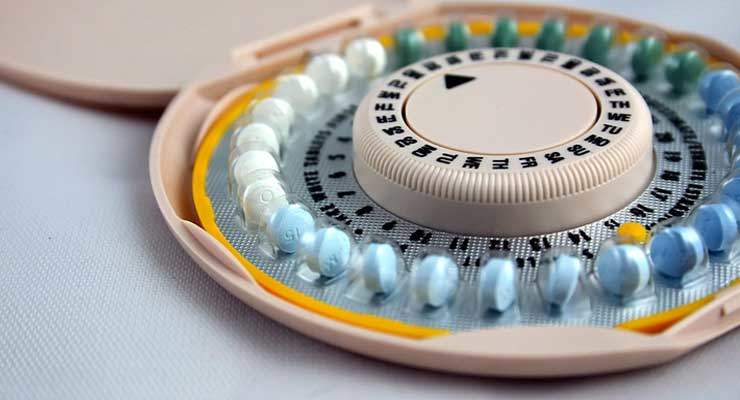Hormonal birth control, including the pill, patch, vaginal ring and birth control shots, is one of the most popular contraceptive choices. Unfortunately, while hormones are a great way to prevent pregnancy, they do come with side effects, including weight gain, according to the Women’s Health Resource website. Lower doses or alternate delivery methods can reduce the likelihood that you’ll gain, or you can opt for a different type of birth control altogether. Consider your options carefully to select a birth control method that works for you, prevents pregnancy and does not pack on the pounds.
Function
Birth control methods function in one of several ways, depending upon the type of birth control you choose. Hormonal birth control prevents ovulation, thickens cervical fluid and thins the uterine lining, according to Planned Parenthood. Barrier methods of birth control work by blocking the sperm from reaching the cervix. Chemical contraceptives kill the sperm before they can reach the cervix. Barrier methods and chemical choices have no risk of weight gain.
Types
Several types of hormonal birth control are available. Birth control pills typically rely upon a combination of estrogen and progesterone; however, a lower dose pill may cause less weight gain. The patch transfers a larger dose of estrogen and carries with it a higher likelihood of gain. Planned Parenthood does not list weight gain as a side effect of the vaginal ring, but it retains the beneficial effects of the pill. You could also consider an intrauterine device (IUD) with a low dose of hormones, like the Mirena. Typically, the lower the dose of hormones, particularly estrogen, the lower the risk of weight gain on hormonal contraception, according to the Women’s Health Resource website.
Effects
Weight gain on hormonal contraception can come in two forms–actual weight gain or water retention and bloating. The birth control shot, Depo Provera, has a relatively high risk of weight gain compared to oral contraceptives, but no risk of water retention. Bloating and water retention are a common side effect of higher-estrogen birth control methods, like older high-dose pills, according to the Women’s Health Resource website. Higher estrogen levels in the birth control patch lead to a risk of moderate weight gain, according to the American Pregnancy website.
Considerations
Chemical and barrier methods of birth control pose no risk of weight gain or other systemic side effects, but they must be used each time you have sex to prevent pregnancy. Many are not as effective as hormonal birth control. The copper IUD, which prevents pregnancy by thickening cervical fluid and altering the environment of the uterus, is another option for women concerned about weight gain. While the IUD does have side effects of its own, it is more than 99 percent effective, according to Planned Parenthood website.
Prevention/Solution
If you do feel that hormonal birth control is the best choice for you, you can take certain actions to control the risk of weight gain. Choose a low-dose contraceptive like Alesse, Loestrin-Fe, or Mircette if you opt for the pill. According to the Women’s Health Resource website, this will reduce the risks of side effects, including weight gain. Watch your weight, eat a healthy diet, and exercise regularly.
More information on How Body Weight Affects Birth Control:






